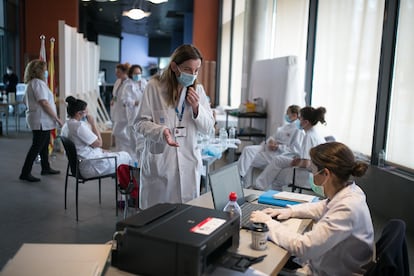Spain launches drug trial into preventing coronavirus contagion among health workers
Some 4,000 professionals at 62 hospitals will test known medicines to see whether they can protect professionals from contracting the disease

Health workers represent around 15% of all confirmed coronavirus cases in Spain – 19,400 professionals have tested positive since the beginning of the outbreak. Of this figure, 10% have been hospitalized, while 20% have been discharged after recovering from the disease.
Given these risks, Spain’s Health Minister Salvador Illa announced on Wednesday that the country will soon begin a clinical trial on how to stop health workers from contracting the coronavirus. The investigation, dubbed the Clinical Trial for the Prevention of Coronavirus Infection in Health Workers (Epicos), is the largest in Europe in this sector, according to Illa. The trial will study 4,000 health workers, from wardens to doctors, at 62 hospitals in 13 regions in Spain.
The Epicos initiative is part of a new wave of drug trials and studies that are already underway or awaiting approval. In the last month, the Spanish Medicines Agency has received 120 proposals for trials, said César Hernández, head of the regulatory agency’s department for human medicines. Of these, 21 have already been approved and are underway.
Hernández said that this surge of initiatives is good because it foments research and makes use of the great potential of Spain’s public healthcare system, which has traditionally been a leading participant in large-scale clinical trials.
Hydroxychloroquine

The Epicos investigation will evaluate to what extent existing medicines, which have so far had promising results against Covid-19 but have not been trialed on a large scale, can protect health workers from contagion. Some volunteers will be given hydroxychloroquine, an anti-malarial drug with antiviral and anti-inflammatory properties; other will take drugs used against HIV (a combination of emtricitabine and tenofovir); while a third group will be given a placebo. The investigation, which will be overseen by the Spanish Medicines Agency, will release its first results in four weeks’ time.
Although the trial is aimed at health workers, the findings from the investigation will be applicable to the entire population and could, for example, be used to treat patients and their carers.
The research is part of the World Health Organization’s Solidarity trial, which was launched at the end of March as part of a rapid global search for drugs to treat Covid-19. The advantage of the trial is that it is testing medicines which have been available for years, meaning that their safety and the adverse effects are well known. What’s more, with the exception of hydroxychloroquine and tenofovir, generic versions of the medicines are already on the market, which significantly reduces the cost.
The investigation has the support of pharmaceutical companies. The Swiss multinational Novartis on Wednesday donated enough hydroxychloroquine to treat “tens of thousands” of patients across Spain.
José Ramón Arribas, the head of Infectious Diseases at the La Paz hospital in Madrid, says “there is currently zero evidence” on the effectiveness of hydroxychloroquine, although he supports further investigation.
English version by Melissa Kitson.
Tu suscripción se está usando en otro dispositivo
¿Quieres añadir otro usuario a tu suscripción?
Si continúas leyendo en este dispositivo, no se podrá leer en el otro.
FlechaTu suscripción se está usando en otro dispositivo y solo puedes acceder a EL PAÍS desde un dispositivo a la vez.
Si quieres compartir tu cuenta, cambia tu suscripción a la modalidad Premium, así podrás añadir otro usuario. Cada uno accederá con su propia cuenta de email, lo que os permitirá personalizar vuestra experiencia en EL PAÍS.
¿Tienes una suscripción de empresa? Accede aquí para contratar más cuentas.
En el caso de no saber quién está usando tu cuenta, te recomendamos cambiar tu contraseña aquí.
Si decides continuar compartiendo tu cuenta, este mensaje se mostrará en tu dispositivo y en el de la otra persona que está usando tu cuenta de forma indefinida, afectando a tu experiencia de lectura. Puedes consultar aquí los términos y condiciones de la suscripción digital.








































